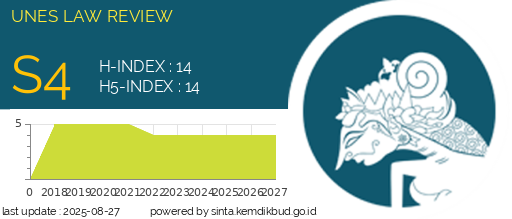Kriteria Pemimpin Negara Menurut Undang-Undang Dasar 1945 Ditinjau Dari Kriteria Imam Menurut Al-Mawardi
DOI:
https://doi.org/10.31933/unesrev.v6i3.1794Keywords:
State leader, Constitution, Al-MawardiAbstract
A leader is someone who has been chosen by a group who is given the mandate to lead the organization to achieve a goal, and is considered to have an influence on others and has an inherent leadership spirit. In Islam, the criteria for ideal leaders are in the Prophet Muhammad, but as ordinary humans, of course, we cannot equalize the criteria for leaders in the Prophet Muhammad, therefore in Islam there are criteria for imams according to Al-Mawardi which are based on the Qur'an and Hadith. In Indonesia, there are criteria for leaders according to the 1945 Constitution and Law No. 7/2017 on general elections. The two criteria certainly have different views, but if the two are compared whether it will be relevant or contradictory. This study will answer the relevance of the criteria of state leaders in Indonesia with the criteria of the Imam according to Al-Mawardi. This study will answer the relevance of the criteria for state leaders in Indonesia with the criteria for imam according to Al-Mawardi. This type of research belongs to the Qualitative category using descriptive analysis methods with data collection techniques, namely library research or literature studies. The 5 criteria for state leaders according to the 1945 Constitution and Law No. 7 of 2017 are relevant to the criteria for imam according to Al-Mawardi, namely according to the 1945 Constitution and Law No. 7 on elections (never betrayed the country and never committed corruption and other serious crimes, educated at least graduated from high school / vocational or other schools equivalent, spiritually able to carry out the duties of his obligations as President and Vice President and free from narcotics abuse, has a vision, mission, and program in implementing the government of the Republic of Indonesia, and the President is a native Indonesian) and according to Al-Mawardi (fair, healthy, knowledgeable, healthy limbs, have a vision and mission, and descendants of the Quraysh). So it can be concluded that the criteria for state leaders according to the 1945 Constitution and Law No. 7/2017 on elections when compared with the criteria for priests according to Al-Mawardi will be very relevant.
Downloads
References
Ahmad Saebani Beni dan Somantri Ii, Kepemimpinan, (Bandung:Pustaka Setia, 2014.
Al-Qur’an dan Terjemahannya, Lajnah Pentashihan Mushaf Al-Qur’an, (Badan Litbang dan Diklat Kementerian Agama RI, 2019).
Arake Lukman , Hadis-hadis Politik dan Pemerintahan, (Yogyakarta: CV Lintas Nalar, 2020).
Arief Sidharta Bernard, Refleksi Tentang Struktur Ilmu Hukum, CV. Mandar Maju, Bandung, 2009).
HR. Ath Thabrani dalam Al Mu’jamul Kabiir 18/57.
Kurniawan, Nof Putra Defri, Zikri Afdal, Mukhtar AH Nurkamelia , Konsep Kepemimpinan Dalam Islam, Jurnal Manajemen Pendidikan Islam (UIN Imam Bonjol Padang, UI Sultan Syarif Kasim Riau, Vol 2 No. 1 2020).
Muhammad Abduh dan Muhammd Rasyid Ridha, Tafsir Al-mannar (Al-Qahirah: Dar Al-Mannar,1947).
Munfaridah Tuti, Kepemimpinan dalam islam Analisa pemikiran al-Ghazali, (Yogyakarta, tahun 2016).
Putusan Mahkamah Konstitusi Nomor 90/PUU-XXI/2023.
Ridha Abu, Karakteristik politik islam, Tarbiyah Siyahsiyah, (Syaamil Cipta Media, Bandung : 2004).
Safriadi, Marzuki, Analisis Komparatif Tentang Kriteria Kepala Negara Menurut Imam Al-Mawardi dan Imam Al-Ghazali, Siyasah Wa Qanuniyah, (Jurnal Mahad Aly Raudhatul Ma’arif, Vol 1 : No. 2, Desember 2023).
Sjadzali Munawir, Islam dan Tata Negara : Ajaran, Sejarah dan Pemikiran, (Jakarta: UI Press, 1990).
Takhrij hadits: Diriwayatkan oleh imam al-Bukhari dalam kitab al-Ahkam juz 4 hal 235 dan diriwayatkan oleh imam Muslim dalam kitab al-Iman juz 1.
Undang-undang Dasar 1945.
Undang-undang No. 7 Tahun 2017 tentang Pemilihan Umum.
Yoga Widyatma Zulfikar, Konsep Kepemimpinan Menurut Al-Mawardi, (Institut Studi Islam Darussalam, Vol 8 Nomor 1, 2014).
Zulkarnaen, Sistem Perbandingan Pemerintahan, (Bandung: Pustaka Setia, 2019).



















